Quite The Spectacle!
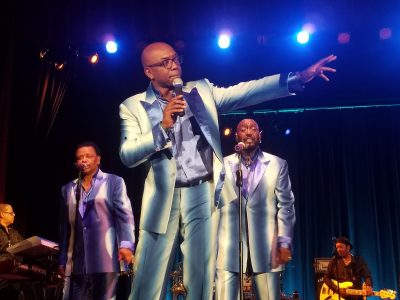
CARY HALL IN LEXINGTON, A 90-YEAR-OLD LANDMARK, HAS BECOME A PREMIER VENUE FOR MUSIC & ENTERTAINMENT THANKS TO THE INSPIRED PARTNERSHIP BETWEEN THE TOWN AND SPECTACLE MANAGEMENT.
P ete Lally is a busy man.
Busy is the name of the game when you’re managing Lexington’s Cary Hall and a slew of similar other venues spread throughout the New England region as president of Spectacle Management, the Lexington-based organization that books, markets, tickets and promotes a gamut of live events. On top of that, it’s summertime, and from the days of Elvis’ first shoreline shimmies, that also means it’s music season. Venues like the TD Garden and Gillette Stadium boast summer lineups this year that are reaching new heights and speeds with their ticket sales – and with superstar acts like U2, Harry Styles, and Kenny Chesney representing just a fraction of the A-listers who have bought (or will be bringing) their sold-out acts to the area for multiple-night-stands as the thermometer outside rises this summer, those sales numbers come as no surprise.
But Lally and his team at Spectacle Management have no interest in Ed Sheeran’s ticket sales; they give no thought to the astronomical crowds Jay-Z & Beyoncé will be drawing into the area come August. Their eyes are focused much closer to home.
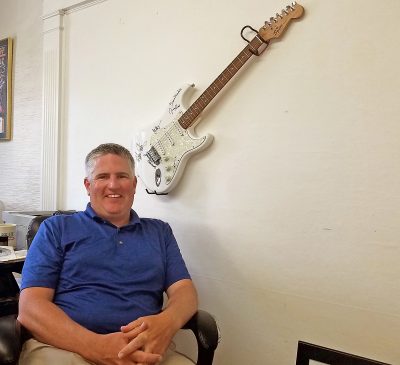
“The vast majority of this business is at smaller, more intimate venues,” says Lally, “stadiums can hold 60,000 people at a time, but most people are seeking a more personal experience. Our focus is giving audiences what I think is a much better experience than going to a stadium show. People who are going to see Taylor Swift or U2 or whoever at Gillette Stadium… to me, that’s like the worst possible way to go see a show. I mean, I know it can be fun, especially if it’s something like a big summer show where you can go tailgating, but what’s your musical experience going to be like there?”
Many heads will nod in knowing agreement to Lally’s argument: it’s one thing to listen to a favorite song in what can be intensely personal and private situations – the darkness of your teenage bedroom, for instance, while a formative album plays to you and only you via a pair of well-worn headphones – and another thing entirely to hear that same song blasted through building-sized speakers across football fields. And then, once the laser shows have faded and the mosh pits have emptied out, even the greatest concert in the world can be ruined by the experience of sitting for three hours in a line to simply make it out of the parking lot, knowing you still face an additional hour’s drive (or more) back to your driveway after that.
“It’s something we always hear the converse side of in Lexington,” says Lally, “where it’s like, “Oh wow, this is great! I can be home in ten minutes!’ A lot of our audience includes people who don’t want to sit in those Gillette Stadium parking lot lines for two hours after the show just to get out of there.” With every act Lally draws in closer to home, there’s also a tangible spike in the hosting community’s economic development as a result of concert-goers’ garage and parking lot fares, restaurant tabs at local eateries, and sales at local small businesses; it’s a more convenient, holistic, and most importantly, local alternative to the stadium show experience Spectacle Management has steered clear of. Jim Shaw who publishes Lexington’s Colonial Times and serves as chairman of the board of the Lexington Chamber of Commerce agrees. He says, “There is clear evidence that the Spectacle shows are having a profound impact on the local economy. Several of Lexington’s restaurateurs have reported significant increases in business on the evenings where performances are taking place at Cary Hall. In fact, Il Casale has told me that they often have three full seatings on a performance night rather than their normal two seatings.”
These are things the average music fan might not be planning for when hitting that knee-jerk “purchase” button on the ticket vendor site of their choice… but Lally’s mind seems to have been naturally geared towards this more logistical side of the creative business right from the very beginning. A founding member of an informal after-school band with his friends in the fourth grade, Lally remembers that, “even in that little band, all through middle school and high school, I was always the one who had the greatest interest trying to find us gigs, trying to book us somewhere, and who wanted to work out the logistics side of it to get us performance opportunities. The other members were too, but I was always the most upfront about wanting to be involved in that piece of it.”
Lally played with this same band all through middle and high school, and later had his first taste of the sheer event a large-scale live show can be at a Van Halen performance at the Worcester Centrum in the mid-1980s. Encouraged by his parents, one a teacher and the other an accountant, to pursue this untraditional (many parents will read: risky) career path, Lally then moved from his native Southborough to the sunny shores of Miami for a degree in music business from the University of Miami, where he also earned a subsequent Masters in communications.


“I had this realization [during that time] that a promoter is sort of the overarching figure behind all live gigs who makes it all happen, and I had a moment of ‘oh, that’s what I want to do. I want to be that person who does that.’” Armed with this new clarifying epiphany for his career ambitions and a headful of business acumen gained between afternoons on Miami’s hottest beaches to make it happen, Lally came back to Massachusetts’ colder shores, where he soon landed at the Lowell Memorial Auditorium as a marketing director. As one of the Merrimack Valley’s larger and more historic venues, the Lowell Auditorium was a better place for Lally to learn the ropes than he may have initially been expecting. “It was just a matter of me being very lucky and the timing working out perfectly. I jumped onboard over there thinking ‘alright, this is a relatively easy commute and I can just do a good job for the little while I’m here, while I figure out what I want to do in the next year or so.’ Fourteen years later, I was still there. I loved it.”
At the end of those fourteen years, however, and with the Auditorium’s future up in the air between new potential contract buyers, Lally’s entrepreneurial itch caused him to strike out on his own in 2013 and create Spectacle Management. Originally comprised of just Lally and a laptop out of his home bedroom, Spectacle Management now presides over eight local venues… including, most recently, a full-circle return to the Lowell Memorial Auditorium. Lally explains, “ I moved the business to Lexington because we were excited to be part of Cary Hall and the community around it. Great shops and restaurants―it was a complete experience. We had to be there.”
“I moved the business to Lexington because we were excited to be part of Cary Hall and the community around it. Great shops and restaurants―it was a complete experience. We had to be there.” -Pete Lally
Pete doesn’t take his responsibilities lightly. When he first arrived in Lexington he spoke to several organizations including the Rotary Club. He signed up at the Chamber of Commerce and quickly joined their board of directors. He was soon asked to sit on the chamber’s executive committee where many of the chamber’s initiatives begin. Pete is also a long-time member and vice-chair of the board for the Greater Merrimack Valley Convention and Visitor’s Bureau (GMVCVB). Shaw explains that he was impressed with Lally from the outset. Shaw says, “I first met Pete when I joined the GMVCVB board. I knew quickly that Pete and I would become fast friends―we had so much in common―we both were committed to being involved in the community, and particularly interested in the impact of tourism and events on economic development. Pete first mentioned to me his idea about coming to Cary Hall, and being a Lexington Native I was excited. The idea of bringing these types of acts to Lexington was something that I had only dreamed about. But, Pete and his team from spectacle management actually made it happen. On more than one occasion I have jokingly said the arrival of Spectacle Management at Cary Hall is the ‘greatest thing since the American Revolution.’”
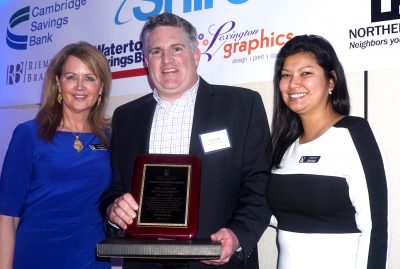
One of the reasons that Pete’s able to book so many great shows is that he works with multiple agencies, and spends time in New York meeting with talent representatives. He has a keen insight into the process and knows that he has to keep the interest of his audience in order to expand his base. He explains, “Every show we learn more about what audiences like and dislike. We talked with a lot of agents who act as advisors for us. They let us know what talent is available, and when and what type of experience the artist is looking for. The challenge in New England is that there are lots of great venues to choose from. From the beginning, our challenge was ‘what do we have to do to get Cary Hall to be a viable consideration when artists are choosing where to perform in Greater Boston Market?’”
Soon after the successful launch of Spectacle at Cary Hall, the shows were shut down for about 18 months while Cary Hall went under a $10 million renovation. Cary Hall is the home of the Lexington Symphony, and would now serve as a venue for world-class talent. The acoustical upgrades were an important part of the plan for helping to draw the kind of talent that Spectacle Management has been able to bring to Lexington.
Spectacle Management under Pete’s leadership has grown to include multiple venues. Beginning at Cary Hall, his list of venues has grown to include the Shalin Liu Performance Center in Rockport, the Lowell Auditorium, Plymouth Memorial Hall, and he now runs the “Spotlight Series” on Cape Cod including venues such as the Tilden Arts Center, the Barnstable Performing Arts Center, the Whaling Church, and the Walker Auditorium on Nantucket.
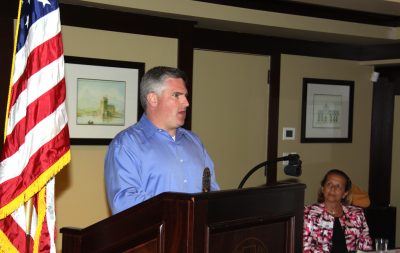
“What we’ve done is build up a roster of venues that we can offer to agents,” explains Lally, “so we can see which ones would best match their artists. Rockport [the Shalin Liu Performance Center] seats 300, Cary Hall is over 800, Lowell seats 2800, and we’ve got pretty much the entire spectrum in-between. So if agents have an act where they come to us and say ‘hey, I’m bringing so-and-so into the Northeast, do you have a building that would work?’ we have a sort of menu we can offer them and say ‘alright, let’s find the best fit.’”
With his growing empire Pete is committed to staying in Lexington. Much of a staff has moved to offices at the Lowell Auditorium, however, he chooses to remain in Lexington where he feels he can get a better look at the overall landscape of producing these types of shows in the Greater Boston area. We talked about his first series in 2013. When he first proposed a series of concerts of Cary Hall, the list of artists included some heady names. Artists such as Judy Collins, The Canadian Brass, Manhattan Transfer, The Irish Rovers, and the legendary Mavis Staples. Pete referred to it as a “kind of a proof-of-concept” for himself and for the town. Pete said, “The town was curious as to how this would work and so was I. As it turned out the first five shows were very successful. The shows were popular in the community, and we knew it was just the beginning.”
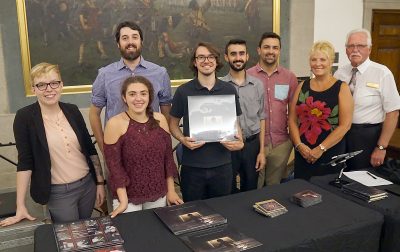
With acts like Dennis DeYoung of STYX, Nils Lofgren (of Bruce Springsteen’s E Street Band fame), and Air Supply all making stops at Lexington’s Cary Hall over the next few months, and with other performances from the likes of Art Garfunkel and the Lexington Symphony making regular appearances, times are definitely good for Lally and his Spectacle team. He’ll readily admit, however (with a refreshing amount of honesty and frankness), that such is not always the case. “It’s not a great paid lifestyle,” he chuckles, “or CERTAINLY not at first, anyway. If this, or any art, becomes your chosen field and you’re right out of college, don’t ask your engineering or computer science friends what their paychecks are like compared to yours. You get there eventually if your luck holds, but it’s tough, y’know? In a lot of cases, it’s worth it to say to someone ‘Look, go take that engineering job you were offered and then play in a band on the weekend or something. Throwing yourself wholeheartedly into a lifestyle spent in dedication to music or any other art isn’t the only way you can scratch that inner itch for it. You can love music and not have to give up your life to it. Otherwise, you have to make a lot of sacrifices and compromise… you’re going to have to work a lot of weekends and holidays, and spend a lot of time away from where you normally would be otherwise if you’re starting or raising a family… and you never want it to be where that love of the thing that you started out with gets extinguished by all that. So it takes a bit of asking yourself what kind of balance you need, at a very early stage, before you get into it all. There’s no one right answer.”
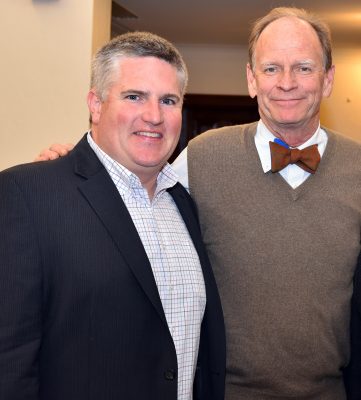
Perhaps not. Lally himself, at least, seems to have found his own right answer. As Spectacle grows its venue selection and capacity, celebrity clientele, and local prestige, family priorities still haven’t been swept aside. Far from it: Spectacle’s finance director is none other than Lally’s own father, who he says is the biggest kid on staff. Striking this delicate balance means that, no matter how demanding a touring act may be – Lally chuckles acknowledgement that there’s been a few celebrities of the “I only want green M&Ms in my dressing room!” variety over the years – or how many increasing logistical feats his expanding empire demands, he still retains the same love for the industry as he did when booking his fifth grade talent show all those years ago. “After 20 years of doing this, I’m still looking forward to the shows (and everything around them),” he says. “The artists get more zeroes in their paychecks, which is something I didn’t have in the fifth grade, but what keeps me around is that I still get that same thrill. It’s fun.”

